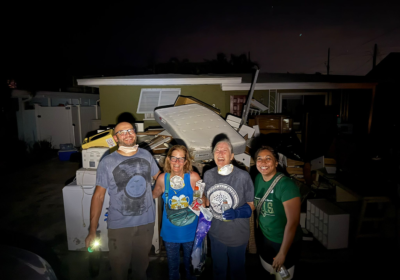Currall works to build bridges with Senate

Student success echoed throughout the Student Government (SG) Senate meeting on Tuesday after a speech from USF President Steven Currall and the Dean of the Judy Genshaft Honors College Charles Adams about building connections between students and administration.
Currall spent an hour talking to senators about issues and concerns they raised regarding the USF community and how the administration will be tackling issues such as international student concerns, mental health and institutional funding moving forward.
Senate President Salud Martinez said that the purpose of Currall’s first ever visit to the Senate was to build and strengthen connections between SG and administration for the upcoming years.
“It’s always really important to have a healthy relationship, just so that we’re working together and not working against each other,” Martinez said. “And within the first year of Currall’s presidency, it’s going to help set the pace of what that relationship is going to look like. So the stronger we build the foundation, the better off we will be as an institution.”
During the discussion, Currall said that one of the most crucial factors affecting students’ educational experience is the quality of the faculty inside the classrooms.
“If we have great faculty, you will have a great experience in the classroom,” Currall said. “If you have a great experience in the classroom, you [will be] successful in your careers and, as future citizens, in a position to support the university, financially or in other ways.”
Student success played a big role throughout the discussion, especially on opportunities and resources available to students from different demographics. During the meeting, Sen. Junayed Jahangir brought to Currall’s attention the struggles and hardships faced by international students when looking for job and internship opportunities due to restrictions on their visas.
As an international student, Jahangir spoke about his personal challenges when he attended last year’s on-campus career fair and was rejected by several employers due to his international status. While there were more than 200 job opportunities available during the career fair, Jahangir said that his options went down to three.
“Because of all the hardships that come with hiring international students, under the current national administration, a lot of career services that international students go to, we come across employers ready to reject us on the spot saying that they’ve stopped offering internships and jobs to international students,” Jahangir said.
Currall highlighted that while he doesn’t have the power to change national policy, he encouraged students to vote for a society where job opportunities are available to all people living in the U.S.
“One of the things I love about USF is that it is an institution that is an engine of the American dream,” Currall said. “It really is so compelling in terms of the diversity of our student body. My wife immigrated to this country, so I’ve been through the process. She’s now a U.S. citizen, but she wasn’t when she came here.
“I have a lot of sympathy and empathy on that issue, however, in terms of changing, you can’t really change national policy, but we can vote.”
While the topic shifted to funding student resources, Sen. Gary Lopez-Perea emphasized the importance of the discussions about mental health on campus. He questioned the ways in which the university was working toward supporting students and delivering the services available to minimize the issue.
“This is a topic that’s going to continue to require sustained resources to continue to buy what our students need in terms of counseling and support,” Currall said. “So we’re going to be mindful of this and in terms of our resource allocation … I will be talking to others who oversee those services to try to understand whether or not we’re really delivering on those services and what else we need to do to further strengthen our capability.”
Currall continued his answer to Lopez-Perea by reflecting on his years in college and the challenges and pressures he faced in regard to mental health.
“One of the things that I love about being at USF is it has a field that’s similar to where I first started college,” Currall said. “I remember back when I was 18 and the issues about academic achievement and identity, political identity, faith, social identity and connectedness to other groups on campus.
“There are all of these pressures that just get focused on you all and it’s really hard. There are always ups and downs and there really should be no stigma about the need for services. So don’t feel like you’re alone, because you’re not. We’ve all gone through these kinds of experiences.”
As the senators and Currall were discussing funding for USF resources, the senators expressed appeals for more allocated money from the state government.
Sen. Yousef Afifi touched base on the “white elephants” of higher education in Florida, referring to UF and FSU, when talking about the investments made by the state government in those universities compared to USF.
Every year, public universities across the state submit to the Board of Governors (BOG) a legislative budget request for investments from the State University System of Florida. For the 2020-21 academic year, USF has requested a total of $37.4 million in additional state resources, compared to $25 million from FSU and $3.8 million from UF.
Currall said that while the BOG controls how much will be invested in higher education in Florida, USF deserves a higher investment across the state compared to other universities.
“If ever there was a university that deserves more investment by the state of Florida, it’s USF,” Currall said. “We have done more with resources… compared to UF and FSU. Our return on investment is astronomical.”
The final allocation will be announced between March and April, according to Currall. Until then, he reinforced the importance of showcasing support for USF’s case.
“All we can do is be up there and be seen while arguing for our case,” Currall said.






